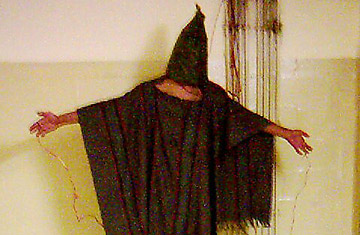
An unidentified detainee at the Abu Ghraib prison in 2003, Baghdad, Iraq.
(2 of 2)
On Bad Intelligence
[The Bush administration] seem to be seeking the kind of intelligence that they want to hear. Not what's really going on. And that's one of the things that I included in my film. I included the example of ibbin Sheik Al-Ibbi, who was giving good intelligence to the FBI at Bagram in Afghanistan, but it wasn't the intelligence the Bush administration wished to hear. So they sent in the CIA, who duck-taped this man from head to toe, stuffed him in a small, plywood box, told him they were going to have unlawful carnal knowledge of his mother and shipped him off to Cairo, where he was waterboarded by Egyptian authorities. Lo and behold, he said that there was a link between al-Qaeda and Saddam Hussein. That information was used by Colin Powell in the United Nations as a prelude to war. A year later, after the war had commenced and after we are now in Iraq, the CIA says, "Whoops, sorry, we made a mistake. In fact, that was a false confession. We shouldn't have been surprised [considering] the studies of the waterboard. But now we're in Iraq. Too bad."
The Economy and War
When you understand what the cost of war is, you have a hard time not connecting it with the troubles in our economy. The policies that this Administration has pursued has been disastrous for all sorts of reasons, and one of these is economics. But I do find it telling that this distant war is something that Americans are somehow just tuning out. And I think the Bush administration has done a good job — if a mendacious one — of convincing people that [the war in Iraq] is still somehow connected to the war on terror, which it has absolutely nothing to do with.
On mainstream versus independent media
I think, early on,
the dominant media — that is to say the major TV networks and to some
extent some of the largest newspapers — played something of a
cheerleading role. It's perhaps natural because after 9/11, Americans
were hurt. They were angry. They wanted payback. It wasn't so much the
reporters' fault. I think it was the editors who determined that their
audience wanted to hear a certain kind of story. So I think they were
somewhat tone-deaf to the truth early on.
About his father, Frank Gibney
My father was a journalist, but before he was a journalist, he was a Navy interrogator in World War II in the pacific theater. He interrogated Japanese prisoners on Okinawa, which was one of the bloodiest battles of the war. He was horrified at the pictures coming out of Abu Ghraib, and even more so when he began to learn that this may have represented the kind of policy,that we were torturing people by choice, not by accident, and by direction, not by occasional rage. My father believed, in World War II at least, they were getting great intelligence by not doing this stuff. Furthermore, they were doing it against an enemy that had tortured us, that was perceived to be fanatical and beyond the reach of reason — all the things we later said about members of al-Qaeda and the Taliban. So he very much encouraged me to make this film.
On the future
There's a thing I used to have when I was a kid growing up called an "8-Ball." You'd roll it around and flip it up and ask it a question, and one of the answers is "Reply hazy, try again."" Well, I think for a long time we're going to be looking at that 8-Ball about Afghanistan and Iraq and the answer is going to continue to be "Reply hazy, try again." It does seem to me that what we need is an administration that pays less attention to its own ideology and more attention to intelligence from the ground — pure, good intelligence that's not filtered through some sort of political mechanism.
